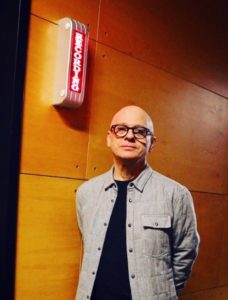David Lang’s symphony without a hero received its premiere on February 8/10 by its commissioner, Seattle Symphony and Music Director Ludovic Morlot. As usual, Lang spells his title in all lowercase letters, a gesture of acquiescence that particularly befits the resigned tone of this work’s namesake, Poem Without a Hero by the Soviet writer Anna Akhmatova. Lang, who is quite the Russophile, took his inspiration from Akhmatova’s wartime lament for her hometown Leningrad (St. Petersburg), besieged and abused at the hands of both Nazis and Stalinists. Lang’s reflections present as a single-movement essay that, regardless of one’s feelings toward postminimalism or orchestral composition in general at this stage of the 21st century, surely deserves to be ranked among his most compelling works.
Lang conceived symphony without a hero as the unfolding of “a melody that goes from the beginning of the piece to the very end—a 28 minute tune”. This melody, closer to 23 minutes at Morlot’s tempo, lies in the bass instruments: a gruff pseudo-ostinato that constantly tries to climb a C♯ minor triad (C♯ G♯ C♯ E) without ever literally repeating itself. It’s somewhere between a “real” tune and a clumsily-executed arpeggio exercise (imagine the fragmentary musical gestures of The Little Match Girl Passion, but louder and harsher). Above it the high strings, coupled with other treble instruments, spin a tonally ambiguous web of overlapping sustained tones derived from the bass tune, creating an effect akin to the angelic choir atop Ives’ texture in the Prelude to his Fourth Symphony. There’s little going on in the middle registers—it’s as though each instrument is compelled to choose between bass and treble. As Lang puts it, the two sides “don’t talk to each other”.
As from a tower that commands the view
From nineteen-forth I look down.
As if I bid farewell anew
To what I long since bade farewell,
As if I paused to cross myself
And enter dark vaults underground.(1941, Leningrad under siege)
– Anna Akhmatova, translated by Nancy K. Anderson

Lang has spoken about being led into composition through his early encounters with Shostakovich. And the tone of his symphony is akin to Shostakovich’s Leningrad Symphony shorn of its triumphalism and cumulative effect. I kept thinking of that piece’s notorious first movement, but with its melodic and harmonic details blasted away, leaving just the repetitive martial rhythms as symbolic foundations to the bombed-out buildings of wartime Leningrad whose smoldering shells remain but whose trappings of life have been pulverized and left to circulate as a disorganized cloud in the smoky air. As if to reinforce the siege metaphor, Morlot positioned the drums at the left of the orchestra with the lower strings and brass on the right, effectively enveloping the jumbled and pleading voices of the treble choir. There’s definitely an edge to this music that you don’t always get with Lang.
Halfway through the symphony the quasi-ostinato stops, leaving the web of treble instruments standing alone. Most prominent here are the violins, supported by some high woodwinds, harps and a celeste. The bass reenters, but now with an alternation of sustained chords a half-step apart, reminiscent of Philip Glass (for whom Lang once worked as a copyist, meticulously typing the lyrics of Akhnaten into the score). As before, bass and treble proceed independently until the bass finally drops out entirely, leaving the violins (just as in Ives’ Symphony) with the last word.
To complete the evening Morlot paired Lang’s symphony with its putative opposite, Strauss’ Ein Heldenleben (A Hero’s Life) from 1898. The antebellum naiveté of that old warhorse has long screamed out for revisionism, and programming it after the brutal honesty of the Lang only seemed to emphasize its insouciance. If there was a moral to the evening, it was that true heroes are the ones bearing hard witness to bitter truths. In that light we can be grateful for Seattle Symphony’s long record of supporting contemporary music, a record that one hopes will continue despite the imminent departure of both its Music Director Morlot and its President/CEO Simon Woods.
